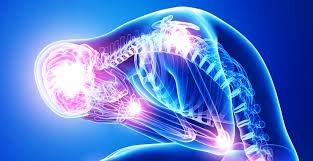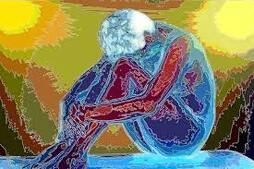What is Physical Pain?

Pain is a necessary signal that alerts us when there is injury (like touching a burning hot stove), or tells us that something is wrong in the body. Chronic pain goes beyond signaling a person to illness or injury, but is instead, is a longer lasting, persistent discomfort that can be a detriment to a person's psychological well-being. Medical intervention often cannot fully resolve chronic pain (Like vertebrae degeneration) or chronic illness (like Lyme disease, fibromyalgia, Lupus or Epstein Barr, among others.) These illnesses often result in a need for pain management including various forms of opiods, injections, infusions, and other treatments for chronic autoimmune illnesses.
In recent years, research has shown that a bio-psycho-social model of treatment has helped patients in managing the pain they experience. Patients report LESS overall perceived pain when he or she learns the "language" of the body - and to listen to what it is trying to say.
For example, just one process that I teach involves moving into a meditative state, where I guide him or her toward understanding what the pain means. Thereafter, there is a cascade effect of deeply accepting (and even loving) their pain. Studies show (and my clinical experience concurs) that when we CONNECT with our physical pain, instead of fighting it, or running from it, relief can be permanent. Mindfulness therapy can change our relationship to our bodies and the sensations we experience there. Using treatments like Hypnosis, Somatic Experiencing and Internal Family Systems, a patient can come to a healthier understanding of oneself, one's body, and the world (s)he lives in. In short - life can become more more tolerable, and even positive and joy-filled.
How does trauma and Complex PTSD affect our bodies, our health, and the way we perceive pain?
How Do Therapists Work With Clients in Chronic Pain?
The "mind-body connection" is a phrase that is thrown around a lot, but what does it really mean? It means that psychological pain can manifest as physical pain, and vice versa. The way that you feel physically influences the way that you think and feel - and conversely, what you're thinking and feeling can have a definite worsening effect on the pain you're experiencing in your body. Most importantly - it means that your painful experiences from the past may be CAUSING your physical discomfort.
If your thoughts and feelings can create pain in your body - your thoughts and feelings can stop the pain in the your body.
The word “feeling” implies an emotional sensation. Interestingly, psychology looks at "emotional feelings" as a bodily experience. If you learn to pay attention in the right way, you can identify WHERE your emotional trauma lives in your body. Surprisingly, those feelings often live at the site of your injury or illness. When we find WHERE they are, we can work with the emotional signature that may be causing or worsening your pain.
Chronic pain can cause a person to feel depressed and hopeless. The opposite can also be true. Depression and hopelessness often CAUSE chronic pain or illness, too. Psychotherapy has been shown to significantly help people who experience physical illness or injuries.
If your thoughts and feelings can create pain in your body - your thoughts and feelings can stop the pain in the your body.
The word “feeling” implies an emotional sensation. Interestingly, psychology looks at "emotional feelings" as a bodily experience. If you learn to pay attention in the right way, you can identify WHERE your emotional trauma lives in your body. Surprisingly, those feelings often live at the site of your injury or illness. When we find WHERE they are, we can work with the emotional signature that may be causing or worsening your pain.
Chronic pain can cause a person to feel depressed and hopeless. The opposite can also be true. Depression and hopelessness often CAUSE chronic pain or illness, too. Psychotherapy has been shown to significantly help people who experience physical illness or injuries.

Understanding your inner self - your emotions and thoughts - goes a long way toward dealing with what's going on in your body. Coming to peace with your past very often clears physical pain. (It usually comes as quite a welcome surprise when a person experiences pain relief in therapy sessions!) We usually see a temporary clearing of physical pain (several hours to several days) in about 85% of our sessions together, and there can be a permanent clearing of physical pain about 50% of the time.
We'll use meditation, mindfulness and light-trance hypnosis along with inner constellation work to clear out old, stagnant belief patterns that are literally stuck in your body's tissues. To many, it seems like a mysterious thing ...until they experience it. But the evidence is there through decades of research: healing emotional blocks and old trauma changes our experience of pain and illness inside our bodies.
"Chronic pain is reported in 20 to 80% of individuals with a history of (relational or physical) trauma. Patients with chronic pain and a history of trauma have worse functional status, report greater distress, and demonstrate worse responses to medical intervention." ~ The National Institute of Health
Sessions are conducted over the phone, as you are encouraged to be lying in your own bed or a comfy couch to do this very relaxing work. Try 3 sessions with Paige and see if you're not impressed with the kind of progress that can be made through psychological-somatic work.
We'll use meditation, mindfulness and light-trance hypnosis along with inner constellation work to clear out old, stagnant belief patterns that are literally stuck in your body's tissues. To many, it seems like a mysterious thing ...until they experience it. But the evidence is there through decades of research: healing emotional blocks and old trauma changes our experience of pain and illness inside our bodies.
"Chronic pain is reported in 20 to 80% of individuals with a history of (relational or physical) trauma. Patients with chronic pain and a history of trauma have worse functional status, report greater distress, and demonstrate worse responses to medical intervention." ~ The National Institute of Health
Sessions are conducted over the phone, as you are encouraged to be lying in your own bed or a comfy couch to do this very relaxing work. Try 3 sessions with Paige and see if you're not impressed with the kind of progress that can be made through psychological-somatic work.
If You Aren't Feeling Comfortable in your "SKIN"
You're Not Standing in the Truth of ALL THAT YOU ARE.
Take the ADVERSE CHILDHOOD EXPERIENCES test.
This ACE test is designed to help you understand if you have an increased risk of health concerns associated with adverse childhood experiences, like abuse, neglect, attachment trauma, complex PTSD, feeling like you didn't matter, feeling like you weren't understood, feeling like you didn't fit in anywhere. The results from this test can’t tell you your actual health outcomes, but a high score may suggest how important working with trauma-informed professionals will be to your recovery.
